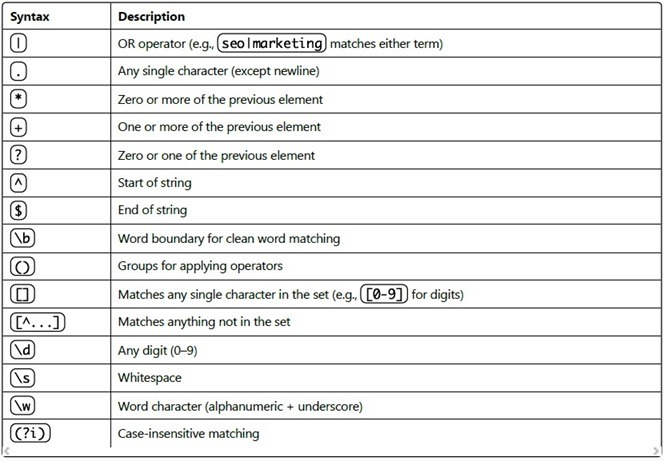Unlocking Google Search Console with Regex
This REGEX guide compiled at JJSEO dives into 10 advanced regex filters, split evenly between local organic search and enterprise-focused keywords, designed to help you uncover user intent,optimise content, and spot technical opportunities.
TECHNICAL SEO
Jorge Jaroslavsky
6/8/20255 min read


A Technical SEO's Guide to Local and Enterprise Insights
After a long time in SEO, with a computer science degree shaping my approach, I've learned that the real power of Google Search Console (GSC) lies in its ability to reveal granular insights—if you know how to slice the data. Regular expressions (regex) are the scalpel for this job, letting you carve out precise segments of queries and pages that standard filters can't touch. Whether you're chasing local search dominance or targeting enterprise clients with complex needs, regex transforms GSC's raw data into a gold mine of actionable patterns. This guide dives into 10 advanced regex filters, split evenly between local organic search and enterprise-focused keywords, designed to help you uncover user intent, optimise content, and spot technical opportunities. These aren't cookie-cutter examples—they're battle-tested patterns I've refined over years of wrestling with messy datasets.
Regex in GSC: The Technical Foundation
GSC uses RE2, a lean regex engine that's fast but lacks some PCRE features (notably positive look behinds,though negative look behinds are supported). If you're new to regex, think of it as a query language for pattern matching—similar to SQL but for text strings. Here's the core syntax you'll need:
Test every pattern on regex101.com before applying in GSC—RE2 is unforgiving if you miss a detail. Apply filters in the Performance report under "Query" or "Page," selecting "Custom (regex)" and choosing "Matches regex" or "Doesn't match regex."
Query Filters for Local Organic Search
These filters, applied under the "Query" drop down, zero in on location-specific searches to supercharge local SEO.
1. Pinpoint "Near Me" Queries
Regex: (?i)\bnear me\b
Explanation: Captures queries with the exact phrase "near me" (case-insensitive). The \b boundaries ensure it doesn't grab "nearby" or "pioneer me." This is a clean way to isolate high-intent local searches.
Use Case: Spot queries like "SEO consultant near me" to optimise location-specific landing pages. Pair with geo-targeted content to boost click-through rates (CTR) and local pack rankings.
2. Extract Location-Specific Queries
Regex: (?i)\b(in|at|for) (london|manchester|birmingham|uk|[a-z\s]+)\b
Explanation: Matches queries with prepositions ("in," "at," "for") followed by UK cities or a generic multi-word location ([a-z\s]+). The \b prevents partial matches like "india." I've used this to segment regional intent without over complicating the pattern.
Use Case: Identify searches like "digital marketing in Birmingham" to craft city-specific blog posts or service pages, targeting local SERP features.
3. Uncover Long-Tail Local Queries
Regex: (?i)^(\w+\s){2,}(in|near|at) (london|manchester|birmingham|uk|[a-z\s]+)$
Explanation: Targets queries with 3+ words ending in a location modifier (e.g., "SEO content strategy in Manchester"). The (\w+\s){2,} captures multiple words, and the final group ensures a location anchor. The ^ and $ lock the pattern to the full query.
Use Case: Find niche queries for hyper-local content. These low-competition terms are gold for ranking in specific markets, like "technical SEO audit in London."
4. Filter Out Irrelevant Locations
Regex: (?i)\b(in|near|at) (new york|california|india|australia|sydney)\b
Filter Type: Doesn't match regex
Explanation: Excludes queries with non-target locations. The pattern is flexible—swap in any regions irrelevant to your focus. I've used this to clean datasets for UK-only campaigns. Note: Be careful with partial matches—this filter might exclude legitimate queries like "New York style pizza" if that's relevant to your business.
Use Case: Focus on UK-relevant traffic to avoid noise from international queries, ensuring accurate performance analysis for local optimisation.
5. Capture Local Service Intent
Regex: (?i)\b(seo|digital marketing|web design) (agency|consultant|services|firm) (in|near|at) (london|manchester|birmingham|uk)\b
Explanation: Matches queries combining services, business types, and locations (e.g., "SEO firm in UK"). The grouped structure ensures all components are present, with \b for precision.
Use Case: Optimise service pages for high-intent local searches, like "digital marketing agency in Manchester," to capture businesses seeking professional support.
Query Filters for Enterprise Terms
These filters target high-value, B2B queries, focusing on enterprise-level intent for complex services.
6. Identify Enterprise Solution Queries
Regex: (?i)\b(enterprise|corporate|large scale|global) (seo|digital marketing|analytics|strategy)\b
Explanation: Captures queries pairing enterprise descriptors with core services (e.g., "enterprise SEO"). The \b ensures clean matches, avoiding terms like "enterprising." This pattern has helped me isolate B2B demand in competitive niches.
Use Case: Develop content addressing enterprise needs, like "Scaling SEO for Global Businesses," to attract high-value clients.
7. Spot B2B-Focused Queries
Regex: (?i)\b(for businesses|for enterprises|for companies|b2b) (seo|marketing|consulting|analytics)\b
Explanation: Targets explicit B2B intent, like "SEO for enterprises" or "B2B analytics." The grouped qualifiers make it specific to enterprise contexts.
Use Case: Create case studies or whitepapers for B2B audiences, positioning your services as enterprise-ready.
8. Detect Comparison Queries for Enterprises
Regex: (?i)\b(seo|digital marketing|analytics|consulting) (vs|versus|compare|comparison)\b
Explanation: Matches research-oriented queries like "SEO vs PPC" or "analytics comparison." Enterprises often compare solutions before committing, making these queries high-value.
Use Case: Build comparison content, like "SEO vs. Paid Ads for Enterprise ROI," to capture decision-makers in the evaluation phase.
9. Isolate Technical SEO Queries (Broader Approach)
Regex: (?i)\b(technical seo|site audit|schema markup|core web vitals|crawl optimisation|structured data|javascript seo|indexability)\b
Explanation: Captures technical SEO queries that enterprises frequently search for. This broader pattern doesn't require explicit enterprise qualifiers, as technical SEO queries often indicate enterprise-level needs by their complexity. Consider running this alongside a separate filter for enterprise qualifiers to cross-reference results.
Use Case: Develop guides on complex topics, such as "Optimising Crawl Budget for Large Websites," to address enterprise pain points while capturing all technical SEO traffic.
10. Capture Budget and ROI Queries
Regex: (?i)\b(cost|price|roi|budget|investment|pricing) (seo|digital marketing|consulting|analytics)\b
Explanation: Matches queries focused on financial metrics, like "SEO ROI" or "digital marketing investment." Enterprises obsess over measurable outcomes, so these are key signals. Added "pricing" to capture more budget-related searches.
Use Case: Create content like "Measuring SEO ROI for Large Organisations" to appeal to budget-conscious enterprise clients.
Applying Regex in GSC
Here's how to implement these filters:
Go to Performance > Search Results in GSC
Click + New and select Query or Page
Choose Custom (regex) from the drop down
Enter the regex pattern
Select Matches regex or Doesn't match regex
Click Apply
Note: Google occasionally updates the GSC interface, so menu locations may vary slightly.
Pro Tips from the Trenches
Test Rigorously: I've burned hours fixing regex errors—use regex101.com to simulate RE2 and catch mistakes early. Always test with sample data before applying to live reports.
Layer Filters: Combine query and page filters (e.g., local queries with local landing pages) for multidimensional insights, like cross-tabulating data in a pivot table. This reveals how well your local content matches local search intent.
Export and Analyse: Pull filtered GSC data into Python (pandas) or R to run statistical tests—think correlation analysis between query volume and conversions.
Dynamic Location Lists: For local SEO, script regex patterns to include new cities (e.g., Leeds, Glasgow) as your geographic focus grows. Consider using external tools to generate location-specific patterns at scale.
Enterprise Keyword Mining: Use NLP techniques on filtered queries to cluster related terms, uncovering semantic opportunities for enterprise content. Tools like Python's sci kit-learn can help identify query themes.
Monitor Pattern Performance: Regularly review your regex filters' effectiveness. If a pattern isn't capturing expected queries, refine it based on actual search data rather than assumptions.
Closing Thoughts
Regex in GSC is like a data scientist's lens for SEO—it lets you cut through the noise to find patterns that matter. These 10 filters, honed from years of trial and error, help you zero in on local and enterprise opportunities with precision. Whether you're optimising for "SEO services in Leeds" or "enterprise analytics ROI," they'll surface the insights you need to outrank competitors and drive results. Start experimenting, test relentlessly, and let the data guide your next move. If you like to talk about how I can help your brand to grow, contact me!


Expertise
Driving organic traffic with tailored SEO solutions.
Growth
Results
Mail to: jj@jjseo.co.uk
© 2025 JJSEO. All rights reserved. | Expert SEO Consultant in Leeds
